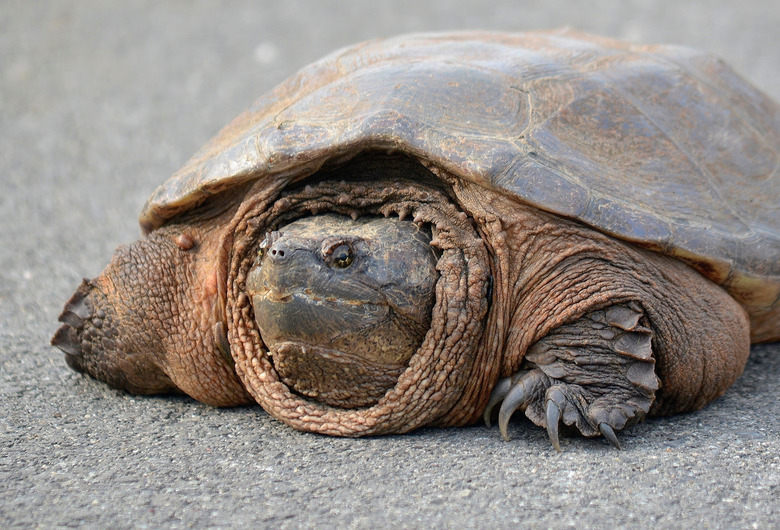How To Determine The Age Of Snapping Turtles
Perhaps no turtle captures the human imagination more than the often misunderstood snapping turtle. These curious and friendly freshwater reptiles live extremely long lives, causing many people to wonder about the age of a snapping turtle they own or meet in the wild.
TL;DR (Too Long; Didn't Read)
While it is impossible to know a snapping turtle's age without its exact hatch date, you can make an educated guess by measuring the turtle's carapace and counting its annuli rings. Always handle a snapping turtle with care and visit a veterinarian for the most accurate estimate of your snapping turtle's age.
A Snapping Turtle’s Life
A Snapping Turtle's Life
Since they have no natural enemies, snapping turtles have an annual adult mortality rate of only 1 to 1.3 percent. Almost all snapping turtles who survive to adulthood enjoy long lives and die of old age. Snapping turtles often live more than 100 years with a maximum theoretical life span of 170 years. While it is impossible to truly know a snapping turtle's age unless you know the precise date it hatched, you can make an educated guess using its shell, which scientists call the carapace.
Measuring Carapace Length
Measuring Carapace Length
If you know the snapping turtle's sex, you can measure the turtle's carapace from front to back to see how it compares with the average adult snapping turtle. While hatchlings are the size of a quarter when they emerge from their eggs, snapping turtles grow quite large with a mean carapace length of 11 inches for adult females and 13.3 inches for adult males. The approximate age for first nesting (sexual maturity) is 19 years old, although this can vary a great deal depending on location and food abundance. Snapping turtles continue growing through their entire lives, although growth slows with age.
Counting Annuli Rings
Counting Annuli Rings
Many people believe they can tell a snapping turtle's age by counting the rings on its carapace – just like counting rings on a tree. This isn't exactly true since the annuli rings on a snapping turtle's carapace show times of food abundance and rapid growth rather than calendar years. Nonetheless, counting annuli rings is still a good way to get a solid estimate for a snapping turtle's age.
Will It Bite Me?
Will It Bite Me?
Whether you plan to measure the carapace or count annuli rings (or both), you might be a bit hesitant to handle a turtle whose name implies it might bite. The good news is that both wild and captive snapping turtles are curious, friendly and unlikely to bite unless they feel threatened. To pick up a snapping turtle, gently grasp it with both hands around and under the edges of the carapace with the turtle's head facing away from you. Never pick up a snapping turtle that seems frightened or angry and never grasp any turtle by its tail. If you are unfortunate enough to receive an unlikely snapping turtle bite, do not attempt to remove the turtle forcibly or kill the turtle; both of these actions harm the animal and cause you more pain. Instead, put the turtle in water and wait for it to release its bite and swim away.
Of course, the best way to estimate the age of a snapping turtle is to visit a veterinarian who specializes in turtles. These reptile experts receive specific training and can examine your snapping turtle's carapace and skin for signs of age.
Cite This Article
MLA
Mayer, Melissa. "How To Determine The Age Of Snapping Turtles" sciencing.com, https://www.sciencing.com/determine-age-snapping-turtles-5891441/. 7 May 2018.
APA
Mayer, Melissa. (2018, May 7). How To Determine The Age Of Snapping Turtles. sciencing.com. Retrieved from https://www.sciencing.com/determine-age-snapping-turtles-5891441/
Chicago
Mayer, Melissa. How To Determine The Age Of Snapping Turtles last modified March 24, 2022. https://www.sciencing.com/determine-age-snapping-turtles-5891441/
